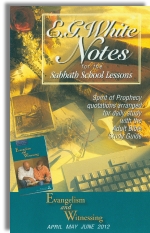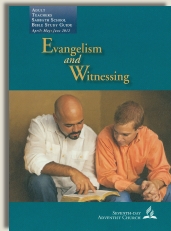|
||||||||||||||
Commentary on "Evaluating Witnessing and Evangelism"
Day 3: Monday, June 18, 2012 - Evaluate Kindly
INTRODUCTION
Today’s main point seems to focus on how we should evaluate. It belabors the point that we shouldn’t criticize too harshly and that we should remember to give those in the ministry “genuine affirmation”. The author states, “If we are overly active in evaluation, and mostly focus on the negatives, there is the potential to create a critical environment that will discourage and decrease your pool of volunteers.” One of the main points encourages the reader to look up Hebrews 10:24, 25, and then asks “What does it mean to ‘consider one another’ in this context? What evaluative principles are suggested?”
OBSERVATIONS
While I agree that we should “evaluate kindly”, this really isn’t a point that needs a whole lesson built around it. As humans, we do have the tendency to get caught up in the details and forget that we need to be kind and thank people for their service and hard work. But, as believers we should be concerned about more important things than getting our feelings stroked. This is not all about “feeling good” and “happy thoughts”. Our focus needs to be getting the gospel out—The Great Commission—not whether we’re going to decrease the volunteer pool. As Christ-followers indwelt with the Holy Spirit, we should exhibit the Fruit of the Spirit, of which kindness is included. With daily submission to His will, we can walk by the Spirit, and not give in to the flesh. Gal. 5:16-18, 22-26 says,
“I say then, walk by the Spirit and you will not carry out the desire of the flesh. For the flesh desires what is against the Spirit, and the Spirit desires what is against the flesh; these are opposed to each other, so that you don’t do what you want. But if you are led by the Spirit, you are not under the law….But the fruit of the Spirit is love, joy peace, patience, kindness goodness, faith, gentleness, self-control. Against such things there is no law. Now those who belong to Christ Jesus have crucified the flesh with its passions and desires. If we live by the Spirit, we must also follow the Spirit. We must not become conceited, provoking one another, envying one another.” Bottom line: being kind (and not critical) should be a given for a true Christ-follower.
In looking at Hebrews 10:24, 25, I see the text (and its context) as being more than “considering one another”. Let’s start at verse 19,
“Therefore, brothers, since we have boldness to enter the sanctuary through the blood of Jesus, by the new and living way that He has inaugurated for us, through the curtain (that is, His flesh); and since we have a great high priest over the house of God, let us draw near with a true heart in full assurance of faith, our hearts sprinkled clean from an evil conscience and our bodies washed in pure water. Let us hold on the confession of our hope without wavering, for He who promised is faithful. And let us be concerned about one another in order to promote love and good works, not staying away from our meetings, as some habitually do, but encouraging each other, and all the more as you see the day drawing near.” (emphasis added)
I see this passage as reminding the believers to know and have full confidence in Jesus’ completed sacrifice….no uncertainty, and no doubts, because He is faithful. Because we know this, the natural outpouring of this will be love and concern for our brothers in Christ. Starting with a correct view of what Jesus has done (completed, not what he ‘is doing’ for us) is key in understanding everything else. Jesus also tells us that He has given us a new commandment:
“I give you a new commandment: love one another. Just as I have loved you, you must also love one another. By this all people will know that you are My disciples, if you have love for one another.” (John 13:34, 35; Mark 12:28-31) The Hebrews passage also reminds us that we should meet regularly as a body of believers to strengthen and encourage each other in the faith. It’s easy to rationalize that one can be a “lone ranger” Christian, or just go out to nature on a hike and somehow that’s a sufficient substitute for regular fellowship with other believers. God’s Word tells us otherwise. We’re created for fellowship with each other and God (1 John 1:6, 7).
Last, but not least, I’d like to mention that how we’re perceived isn’t always a clear indicator of how successful our message really is. We can’t use popularity as a measuring stick. In fact, the more biblically sound the message is, the more offensive and “politically incorrect” it’s considered to be. Prosperity messages will be what people want to hear as we get closer to the end of time. The true gospel calls us to accountability and submission to Christ—two very unpopular concepts in today’s culture. People want to pick and choose what doctrines and biblical truths they want to embrace, shedding the ones that are contrary to their personal comfort. Christ, Paul and many others have experienced (and many are still experiencing) rejection and persecution when being right in the center of God’s will (1John 3:13). They weren’t worried about how well it was received---they were worried about the character of the messenger and the accuracy of the message. The Parable of the Sower (Matt. 13:18-23; Mark 4:1-9; Luke 8:11-15) illustrates that when we scatter the seed, the end result depends on the type of soil. Not all soil will be receptive. We may never personally see the end harvest, but we’re still called to sow the seed—God does the rest.
SUMMARY
- How we evaluate shouldn’t be as important as the accuracy of what we’re evaluating, God’s gospel message.
- While being kind and tactful is important, believers should be concerned with more important things than hurt feelings, and possibly “decreasing the pool of volunteers”.
- Being kind should be a given for a true Christ-follower if they’re led by the Spirit and are in submission to Christ (Gal. 5:16-18, 22-26).
- Heb. 10:24, 25 tells us so much more than just “considering one another”. It’s about having full confidence in Jesus’ completed sacrifice with no uncertainty or doubts—knowing He IS faithful. This confidence leads to loving God and each other, fulfilling what Christ gave as the New Commandment in the New Testament (John 13:34, 35; Mark 12:28-31).
- Heb. 10:25 reminds us that it’s important to meet as a body of believers to strengthen and encourage each other in the faith. We’re not created to be “lone rangers”, but to have fellowship with each other and God. (1 John 1:6, 7)
- Being popular isn’t a good indicator of how successful we are in the ministry. In fact, as we get closer to the end of time, prosperity messages will become common and popular. The true gospel calls us to accountability and submission to Christ—two very unpopular concepts in today’s culture.
- Many have been (and still are) persecuted/rejected for the gospel. This doesn’t mean they weren’t in the center of God’s will.
- Christ, Paul and many others weren’t worried about how well their message was received—they were worried about the character of the messenger and the accuracy of the message above all else.
- The Parable of the Sower illustrates that the type of soil will dictate the success of growth from the seed that has been sown. Not all soil will be receptive. While we may never personally see the end harvest, we’re still called to sow the seed—God does the rest.
Copyright 2012 BibleStudiesForAdventists.com. All rights reserved. Revised June 1, 2012. This website is published by Life Assurance Ministries, Camp Verde, Arizona, USA, the publisher of Proclamation! Magazine. Contact email: BibleStudiesForAdventists@gmail.com.
The Sabbath School Bible Study Guide and the corresponding E.G. White Notes are published by Pacific Press Publishing Association, which is owned and operated by the Seventh-day Adventist church. The current quarter's editions are pictured above.
Official Adventist Resources
Standard Edition Study Guide Week 12
Teacher's Edition Study Guide Week 12
Easy Reading Edition Study Guide Wk 12
Search the Complete Published Ellen G. White Writings
Please Support This Project


